Russia's foreign ministry says the Ukrainian army is responsible for the shelling that killed a man inside Russian territory, warning that the incident could have "irreversible consequences".
Russian investigators say a man was killed and a woman injured when a shell fired from Ukrainian territory landed in the courtyard of a private house in the village of Donetsk, in Russia's Rostov region.
"Naturally, this action will not be left without a corresponding reaction," the deputy foreign minister, Grigory Karasin, said in a radio interview on Sunday. "The talk with the Ukrainian side on this issue is going to be serious and tough."
Over the weekend there was an escalation of both military action and rhetoric in the conflict in eastern Ukraine, as Ukrainian jets carried out air strikes against separatist positions. On Friday, 23 Ukrainian servicemen were killed in an attack using Grad missiles.
"For every soldier's life, the militants will pay with dozens and hundreds of their own," said Ukraine's president, Petro Poroshenko, after Friday's attack.
The Ukrainian army retook a number of towns that had been controlled by separatists in the past fortnight, including the rebel stronghold of Slavyansk, from which hundreds of fighters fled.
The regional centres of Donetsk and Luhansk now contain the main concentration of separatist forces. As these are large conurbations, any attempt to take them back by force is likely to incur major civilian casualties.
On Sunday the streets of Donetsk were nearly deserted after two days of heavy artillery fire in which several civilians were killed.
Marinka, a nearby farming town, was hit with a barrage of artillery for the third day running. The assaults have caused large-scale destruction of apartment blocks, businesses and restaurants.
Who is responsible for the firing remains unclear: both sides have weapons within range of the positions that have come under fire. The Guardian witnessed a convoy of 100-plus Ukrainian military vehicles including multi-rocket launchers, tanks and armoured personnel carriers disappear into fields of sunflowers nine miles south-west of rebel positions on the city outskirts on Wednesday evening.
Vadislav Seleznev, the spokesperson for the government operation, has denied that the Kiev-backed forces are using artillery or air strikes in civilian areas and blamed rebel fire for the casualties.
On Sunday most buses and trains out of Donetsk were fully booked and residents in the areas of fighting could be seen thumbing lifts with whatever possessions they could carry. Tens of thousands are believed to have fled the fighting in region.
In Luhansk, the self-declared Luhansk People's Republic claimed it now had its own air force, made up of a single Su-25 fighter jet seized from the Ukrainian army. This could not immediately be confirmed.
As the violence increases, fears are mounting that Russia and Ukraine could be edging towards some kind of military confrontation again, after a period when it had appeared that the tension was decreasing.
"This incident is evidence of the very dangerous escalation of tension in the Russian-Ukrainian border area, and could have irreversible consequences, the responsibility for which lies with the Ukrainian side," said the foreign ministry's official statement, referring to the shelling of Russian territory.
After Russia annexed Crimea, there were worries that Moscow might order an armed intervention in east Ukraine as well, but these fears were calmed last month when Vladimir Putin, the Russian president, asked parliament to rescind a declaration allowing him to use troops in Ukraine.
Nevertheless, a source close to the Kremlin in Moscow said he believed that while the decision had been taken not to intervene in Ukraine, this could change at any moment.
"I think all it would take would be one day where, say, 300 people are killed in the east and Putin will be simply obliged to act," said the source. "I don't think you can rule it out yet, not at all."
Putin is in Brazil where he is due to watch the World Cup final on Sunday evening. Ukraine's Poroshenko had also planned to attend the event but cancelled at the last minute, citing the deteriorating situation in the east.
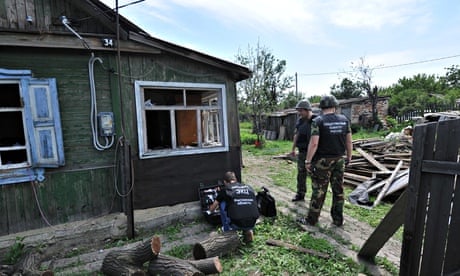
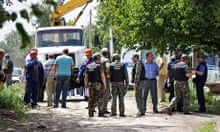
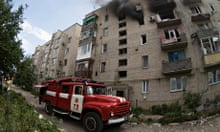
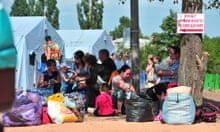
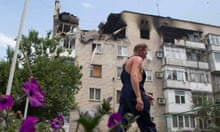
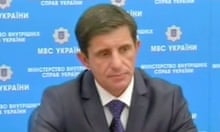
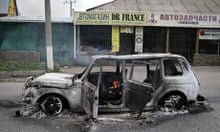
Comments (…)
Sign in or create your Guardian account to join the discussion